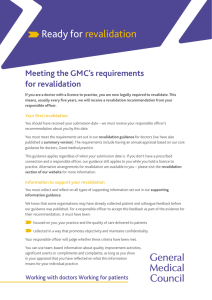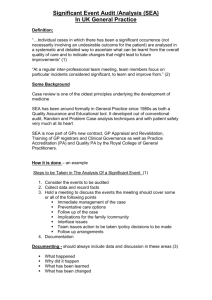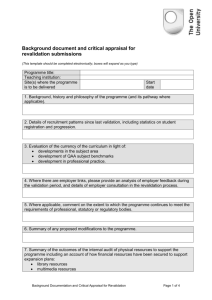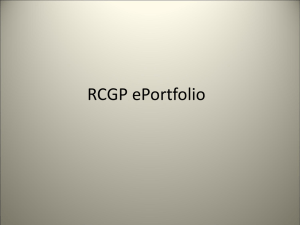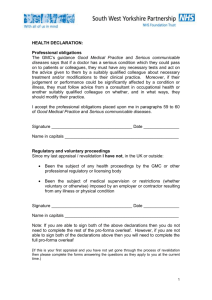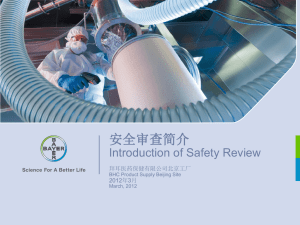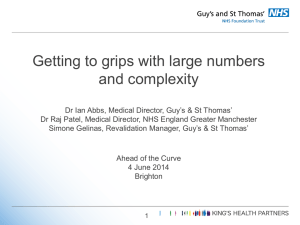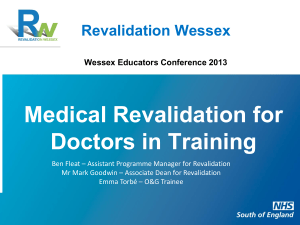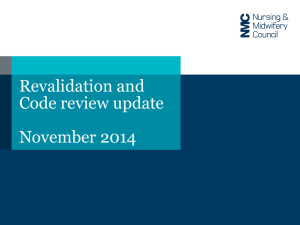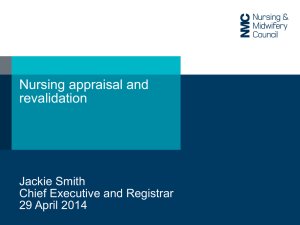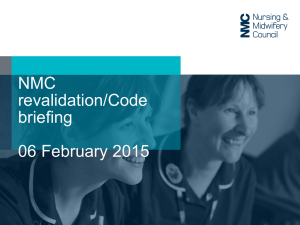julian archer, plymouth - Professional Standards Authority
advertisement
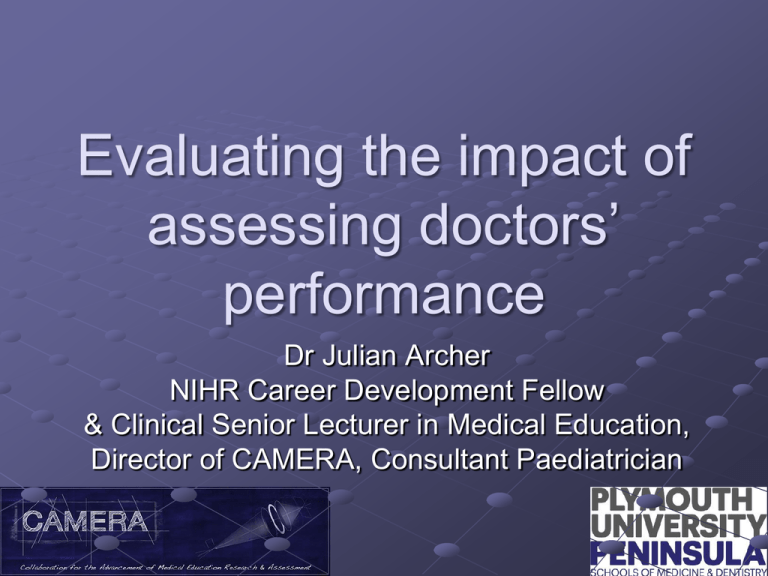
Evaluating the impact of assessing doctors’ performance Dr Julian Archer NIHR Career Development Fellow & Clinical Senior Lecturer in Medical Education, Director of CAMERA, Consultant Paediatrician Evaluating the impact of assessing doctors’ performance Outline Why evaluate impact of assessment? Programmatic research into medical revalidation Some earlier work GMC revalidation evaluation framework Why evaluate impact? APA Validity framework – Five headings Content Response process Internal structure Relationship to other variables Consequences Medical education Predominately all validity areas except consequences Why? Consequences are Complex Socio-political Not positivistic Programmatic approach to evaluation EVALUATING IMPACT OR ‘CONSEQUENCES’ What is Revalidation? Research Questions Setting Method Stage 1 - Policy Stage 2 - Practice What is the meaning of Revalidation? What are the intended and unintended consequences of Revalidation in practice? The Literature Systematic Review Policy makers Ward/Theatre /Lab GP Private Practice Interviewee drawings Appraisees & Appraisers Focus groups Video appraisals Visual anthropology Activity Theory Conversation Analysis Stage 3 - Public Mental Health Appraisee Interviews What is the impact of Revalidation on the relationship between the profession and society? Media Journalist Interviews Analysis of Media Patients Patient Focus Groups Methodology Discourse analysis Outputs •To provide an understanding of Revalidation translational to policy, education and practice •To shape and propose positive consequences while minimising negative consequences of Revalidation •To disseminate positive responses about Revalidation in order to shape future national policy •Ascertain the messages that the public are getting from the media •Develop communication about Revalidation more cost effectively What is Revalidation in policy? - To explore the origins, definitions, and potential purpose of Revalidation STAGE 1 Methods Policy review starting from the Merrison report (1975) 31 unique elite interviews leading members of Revalidation policy development ranged from the leaders past and present of main stakeholder bodies such as the GMC, AoMRC, BMA, NHS Employers, 4 DHs Discourse REGULATION Driven by a professional movement for reform Driven by medical scandal Internally motivated Evolutionary Development Appraisal Formative Development Ongoing evaluation (process) Up-to-date E N T S Restore/maintain confidence by continuing to elevate standards I The Quality Agenda: for patients P A T PROFESSIONALISM Externally motivated Revolutionary change required The Safety Agenda: for patients Reassurance by measuring against a fixed standard Clinical Governance Summative Judgment Point-in-time Decision (product) Fit-to-practise Working with the GMC DEVELOPING EVALUATION FRAMEWORKS Methods – evaluative cycle Step 1: Engage stakeholders Step 2: Describe the programme Step 3: Focus the evaluation question Step 4: Gather credible evidence Literature Interviewed major stakeholders Worked with GMC (Main stakeholder) Develop evaluative questions Develop possible methods for an initial pilot Hansen HF. Choosing Evaluation Models: A Discussion on Evaluation Design. Evaluation. 2005;11:447-462. Stakeholder interview themes Importance of evaluation “people who go through the process…without any thought of what it actually represents and how it might actually add value to the system” What is revalidation for? Drive-up standards (performance improvement) vs. picking out ‘bad apples’ Appraisal “to get inside the closed door of appraisal” RO judgements “I’m not sure exactly how the RO’s decision is made” Summary Impact or consequences of assessment is an important part of validity evidence Complex Programmatic research required (drawing on theoretical perspectives) Acknowledgements and thanks Colleagues Sam Regan de Bere CAMERA team Funders NIHR The Health Foundation General Medical Council Evaluating the impact of assessing doctors’ performance julian.archer@plymouth.ac.uk camera.pupsmd@plymouth.ac.uk www.plymouth.ac.uk/peninsula/research/camera Twitter: @CAMERAPUPSMD
